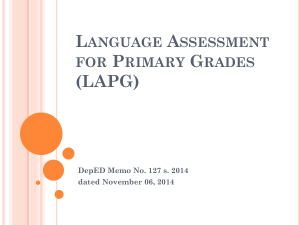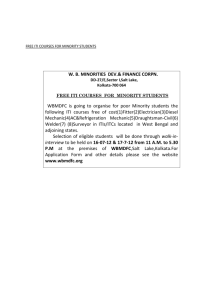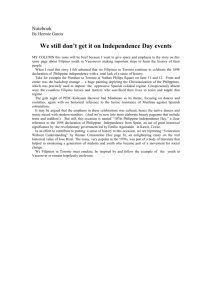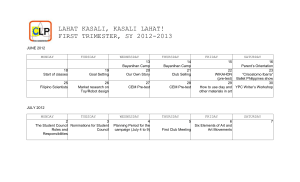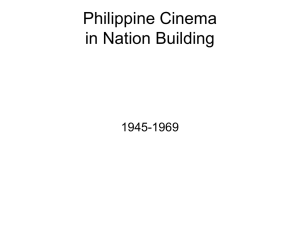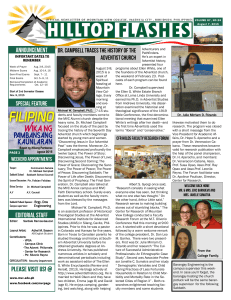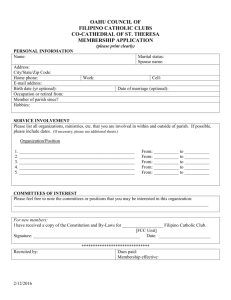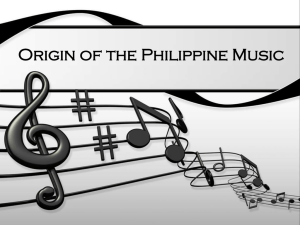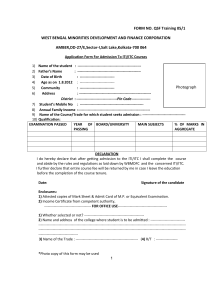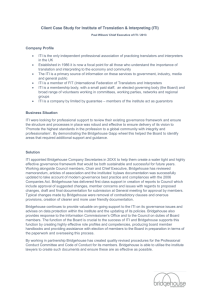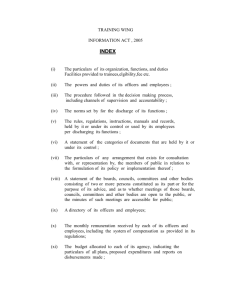Panangipateg iti nakairuaman a pagsasao ken panangital
advertisement
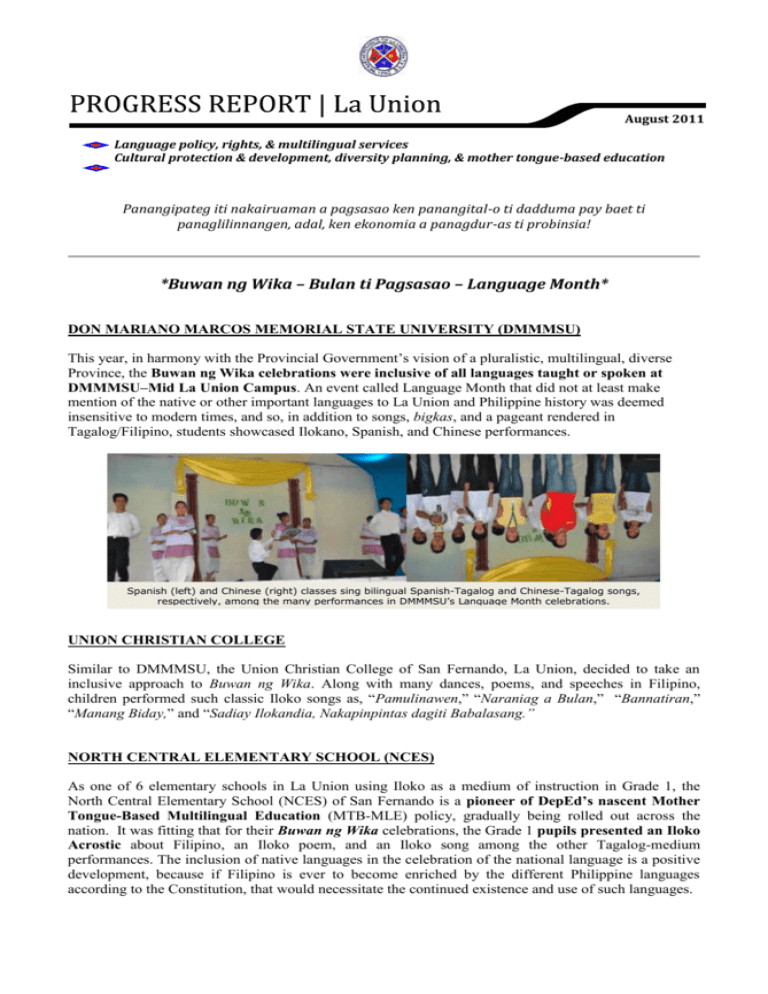
August 2011 Language policy, rights, & multilingual services Cultural protection & development, diversity planning, & mother tongue-based education Panangipateg iti nakairuaman a pagsasao ken panangital-o ti dadduma pay baet ti panaglilinnangen, adal, ken ekonomia a panagdur-as ti probinsia! *Buwan ng Wika – Bulan ti Pagsasao – Language Month* DON MARIANO MARCOS MEMORIAL STATE UNIVERSITY (DMMMSU) This year, in harmony with the Provincial Government’s vision of a pluralistic, multilingual, diverse Province, the Buwan ng Wika celebrations were inclusive of all languages taught or spoken at DMMMSU–Mid La Union Campus. An event called Language Month that did not at least make mention of the native or other important languages to La Union and Philippine history was deemed insensitive to modern times, and so, in addition to songs, bigkas, and a pageant rendered in Tagalog/Filipino, students showcased Ilokano, Spanish, and Chinese performances. Spanish (left) and Chinese (right) classes sing bilingual Spanish-Tagalog and Chinese-Tagalog songs, respectively, among the many performances in DMMMSU’s Language Month celebrations. UNION CHRISTIAN COLLEGE Similar to DMMMSU, the Union Christian College of San Fernando, La Union, decided to take an inclusive approach to Buwan ng Wika. Along with many dances, poems, and speeches in Filipino, children performed such classic Iloko songs as, “Pamulinawen,” “Naraniag a Bulan,” “Bannatiran,” “Manang Biday,” and “Sadiay Ilokandia, Nakapinpintas dagiti Babalasang.” NORTH CENTRAL ELEMENTARY SCHOOL (NCES) As one of 6 elementary schools in La Union using Iloko as a medium of instruction in Grade 1, the North Central Elementary School (NCES) of San Fernando is a pioneer of DepEd’s nascent Mother Tongue-Based Multilingual Education (MTB-MLE) policy, gradually being rolled out across the nation. It was fitting that for their Buwan ng Wika celebrations, the Grade 1 pupils presented an Iloko Acrostic about Filipino, an Iloko poem, and an Iloko song among the other Tagalog-medium performances. The inclusion of native languages in the celebration of the national language is a positive development, because if Filipino is ever to become enriched by the different Philippine languages according to the Constitution, that would necessitate the continued existence and use of such languages. Iloko Acrostic performed by Grade 1 pupils of NCES: B – bulan ti Agosto U – umuna nga intay rambakan W – waya-waya nga intay nagun-od A – awan makaartap iti ragsak nga intay narikna N – nu pay inlupit-lupit na tayo dagiti gangannaet N – nga nangsakop iti pagiliantayo G – gura, pungtot ken unget iti naimula iti panunottayo W – wen intay ngarud itandudo I – iti panangusar iti pagsasao a Filipino K – ket gapu iti daytoy a pagsasao, agkinkinnaawatan dagiti Filipino A – agyamantayo ngarud kadagiti banuar a nangilaban iti waya-waya, agraman kenni Manuel L. Quezon nga ama ti pagsasaotayo a Filipino. NATIONAL GOINGS-ON o The Linguistic Society of the Philippines (LSP), in cooperation with the Ateneo de Manila University Department of English and SIL Philippines, presented the 2011 LSP National Conference and General Meeting on the theme “First Languages First: Mother Tongues and National Development” on Aug 19-20, 2011. The conference aimed to act as a platform for the exchange of ideas and research findings on the role of the mother tongues in national development in economic, cultural and educational terms. The conference aimed to widen the debate on mother tongue education to cover a wide range of issues concerning education and social transformation. Speakers included Kimmo Kosonen, Payap University, Thailand; Ahmar Mahboob, University of Sydney, Australia; Ricardo Nolasco, 170+ Talaytayan MLE Consortium and UP–Diliman; Dina Ocampo, UP–Diliman; Nicholas Tenazas, Asian Development Bank; Rosalina Villaneza, National MLE coordinator (DepEd); and Pedro Walpole, S.J., Environmental Science for Social Change (ESSC). o Kwentong Bulilit 2011 was a first-of-its-kind children’s mother tongue short story writing competition organized by Layap, a new student-led organization committed to research, documentation, fair representation, awareness, and education of Philippine languages. The organization, based at UP Diliman (with chapters perhaps being set up at other universities?), secured official Department of Education endorsement for the competition, aimed at both elementary (Grades 4 to 6: Category A) and high school students (1–4th Year: Category B). Kwentong Bulilit accepted submissions of stories in any of the 170+ Philippine languages in celebration of this year’s Buwan ng Wika, giving due recognition to the diverse cultures, experiences, languages, and traditions of the country’s youth. It secondly aligned with DepEd’s efforts to spur the development of children’s literature in local languages for the realization of Mother Tongue-Based Multilingual Education. In Category A, Christian Felix Manzano of Sta. Lucia, Ilocos Sur, won first place for his “Ti Baut Ket Maysa Nga Pammaneknet Ti Panagayat” (Ang Palo ay Tanda ng Pagmamahal). Lyanne Pineda of Cabanatuan City placed second for her “Sa Libis ng Nayon.” The story of Bea Angela Laya of Cabanatuan City, “Si Dino at Ang Diwata,” grabbed the third spot. For Category B, Ma. Jasmine Carmellie Pama of Iloilo won first place for her story “Ubra ni Nanay” (Trabaho ni Nanay) about a 5-year-old child who constantly wonders what his mother’s job really is. Second placer Monica Mae Chen of Manila wrote “Ang Paglalakbay ni Makoy.” Brigette Campo won third place for “Ang Ibon at Ang Mahiwagang Bulaklak.” The winning pieces will be published in Pambata Magazine, an educational comics and magazine for children. o A Philippine Language Database project has started at the Digital Signal Processing Laboratory at the UP Electrical and Electronics Engineering Institute. The project aims to create a database—also called “corpora”—of 10 of the biggest languages in the Philippines, which include Tagalog, Cebuano, Iloko, Hiligaynon, Waray-Waray, Kapampangan, Chavacano/Spanish creole, Bicol, and a code-mixed language of Filipino and English. Dr. Rowena Guevara, the project leader, says that these language databases are meant not only to preserve the important heritage of our country but also to develop speech-based software applications, such as computer-assisted learning; distance learning; automatic speech recognition; machine translation and corpus-based educational materials for mother-tongue instruction. Agay-ayat kadakayo amin! Prepared by Firth M. McEachern | Consultant, Office of the Governor | Province of La Union | firth.mce@gmail.com
